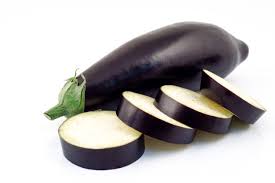The eggplant has a complex etymological history. The word comes ultimately from Sanskrit vatinganals, reflecting the plant’s tropical Asian origins. The term used in India and Africa for the aubergine is brinjat It comes from Portuguese bringella or benitgela, a borrowing from Arabic badhinfan.
In Britain we are mainly familiar with the large somewhat bulbous purple aubergine (indeed the term aubergine has been applied since the late nineteenth century to a particular shade of purple), but the vegetable in fact occurs in a variety of other shapes and colours: long and thin, egg-shaped, pale purple, yellow, white (the term eggplant was originally applied to white egg-shaped aubergines). In many parts of the tropics grows, for instance, the pea aubergine, little bigger than a cherry.
Eggplant Features
Form: the eggplant is a fruit of variable form (spherical, oblong or elongated in most cases) depending on the type.
Size and weight: A medium-sized aubergine is between 5 and 8 centimeters in diameter and 10 to 30 centimeters in length. The weight of the vegetable depends on the variety and ranges from 200 grams of the smallest specimens to 300 grams or more.
Color: The skin has diverse colors: white, purple, black, yellow or red. There are also varieties of marbled skin, that is, with a mixture of several colors, especially white and purple or green. Although purple eggplant is the most common, white eggplant is occasionally found in the market. .
Taste: the aubergine has a mild, very vegetable flavor, with a slight bitter touch.
Eggplant – Properties And Benefits
- It has very few calories (17 calories per 100 grams).
- Improves circulation
- It has antioxidant properties, as it contains vitamin E, anthocyanin, an antioxidant found in the skin of eggplant and protects the body from some types of cancer and heart disease (which is why it is recommended to eat it with skin) and phenolic acids.
- It has a high content of potassium and some sodium, important for the nervous and cardiovascular system.
- Due to its high water content it is a very good diuretic, which helps to lose weight
- Eggplant fiber contributes to purify the body, to lower blood sugar levels (so necessary for people with diabetes, which is a very suitable food for diabetics ), favors the elimination of cholesterol , since it absorbs fats of the foods that are eaten with it and that circulate through the intestine, also favoring the elimination of toxins from the body and regulating intestinal transit. To reduce cholesterol, it is recommended to drink a pint of eggplant water a day for a week.
- Provides a high content of folic acid , very important for pregnant women during the first months of pregnancy
- Its carbohydrate content is low and high fiber, which is why it is a very indicated vegetable for people who have diabetes
- Stimulates the functioning of bile, being very effective in cases of liver failure, for example
- It is a vegetable very rich in magnesium and iron, a large eggplant can contribute up to 15% of the amount of these that is recommended to consume daily. Therefore, it is ideal to prevent anemia, increase and improve defenses as well as heart and muscle function
- Its crushed pulp, has healing and soothing properties for sunburn as well as to relieve the pain caused by rheumatic diseases.
Eggplant Tea To Lose Weight
It can be consumed in the form of tea, boiling for a few minutes a piece of eggplant in a liter of water, then letting the infusion rest for 15 minutes and finally drinking the resulting liquid adding a few teaspoons of lemon juice
3 Eggplant Water To Reduce Cholesterol
Eggplant water is used to reduce cholesterol and is prepared by cutting the eggplant into small pieces and soaking in 1 liter of water for 24 hours in a cool, dark place. You drink ½ liter of water per day for 1 week to achieve the desired effect.
4 Aubergine Oil For Rheumatism
Peel the aubergines and fry them in abundant oil over low heat without burning the oil. Allow to cool, strain and reserve in a glass jar with airtight lid. Apply on affected areas.

